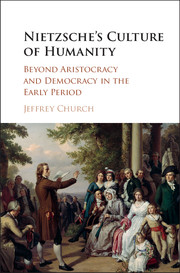Book contents
- Frontmatter
- Dedication
- Contents
- Preface
- List of abbreviations
- Introduction
- PART I The Foundation of Culture in the Early Nietzsche
- Part II Two Concepts of Culture in the Early Nietzsche
- 4 Nietzsche's Exemplary Individuals
- 5 National Culture
- 6 Cosmopolitan Culture
- PART III The Means to Culture in the Early Nietzsche
- PART IV The Significance of the Early Period
- Bibliography
- Index
6 - Cosmopolitan Culture
from Part II - Two Concepts of Culture in the Early Nietzsche
Published online by Cambridge University Press: 05 October 2015
- Frontmatter
- Dedication
- Contents
- Preface
- List of abbreviations
- Introduction
- PART I The Foundation of Culture in the Early Nietzsche
- Part II Two Concepts of Culture in the Early Nietzsche
- 4 Nietzsche's Exemplary Individuals
- 5 National Culture
- 6 Cosmopolitan Culture
- PART III The Means to Culture in the Early Nietzsche
- PART IV The Significance of the Early Period
- Bibliography
- Index
Summary
In the last chapter, I argued that Nietzsche defends “national culture” in his early period. In this national culture, the few and the many collaborate and compete for their common end of human self-determination. I offered this account of culture as important evidence for Nietzsche's meritocratic understanding of culture, which I oppose to the prevailing aristocratic and democratic understandings of culture. However, I hope not to give the impression that I consider Nietzsche ultimately to be a bleeding-heart populist in the tradition of Rousseau and Herder. National culture is only one concept of culture he defends. At the same time, Nietzsche supports a sharply opposed, elitist “cosmopolitan” concept of culture. What explains this divergence? For Nietzsche, the many at some points live up to their vocation as human beings and hence collaborate in the formation of a national culture. Yet more often than not they fail to live up to this vocation, and hence the few must transcend the many and establish a cosmopolitan community to pursue their ends. In my view, Nietzsche can hold both concepts of culture because they respond to two very different problems. Nietzsche develops “national culture” as a response to the problem of our divided nature, whereas “cosmopolitan culture,” as we will see, aims to free us from our enslavement to social conventions and needs.
This chapter has three parts. In the first part, I discuss Nietzsche's explanation for the majority's failure to heed the call of culture. It is not that the many are naturally incapable of culture, but on the contrary, Nietzsche thinks that modern civilization interferes with a natural longing for culture. Nietzsche enumerates three corrupting practices of modern civilization – the state, commercial society, and mass society – and one ethical principle – egoism. Second, I turn to the formation of the cosmopolitan community, which transcends these practices. I argue, however, that Nietzsche does not envision this community as insulated and separated from modern civilization, but rather he intends this community to moderate the effects of these practices by shaming the many into responding to their own conscience. Finally, I close the chapter by arguing that Nietzsche's two seemingly opposed concepts of culture in fact turn out to be complementary. In particular, each reciprocally checks the excesses of the other and in tandem ennoble the animal passions of the many.
- Type
- Chapter
- Information
- Nietzsche's Culture of HumanityBeyond Aristocracy and Democracy in the Early Period, pp. 146 - 172Publisher: Cambridge University PressPrint publication year: 2015



